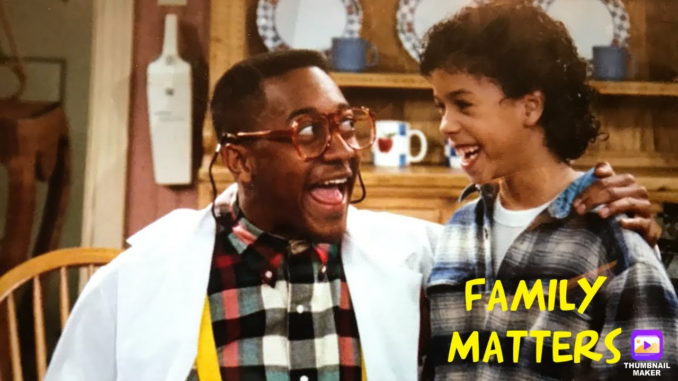
On the classic ‘90s sitcom “Family Matters,” viewers could feel the love in the father-son relationship of Carl and Eddie Winslow. Thirty years later, actors Reginald VelJohnson and Darius McCrary still have that same affectionate dynamic. When VelJohnson greets Darius over a Zoom video call, the younger Winslow doesn’t waste any time before expressing his feelings.
“I’m doing great, I’m doing great, Pops. How you doing?… I love you, man,” says McCrary, speaking from an airport during a layover between flights.

“You know, I think about you all the time,” replies VelJohnson, who in true Dad fashion has somehow logged onto Zoom in two web browsers and can’t un-share his desktop screen. “They didn’t tell you that I’m not computer savvy at all,” he adds. “I’m lucky to see you right now.”
The pair return to the word ‘love’ throughout the conversation, but the reason they’ve been reunited is to discuss an episode from 1994 that pushed their on-screen relationship to its limits. In “Good Cop, Bad Cop,” a police officer racially profiles McCrary during a routine traffic stop. VelJohnson, whose character works as a police officer, initially defends his fellow officers, which leaves McCrary speechless. VelJohnson later confronts the racist cops at a diner in one of the most powerful scenes in primetime history, which has gone viral following the killing of George Floyd by Minneapolis law enforcement.
“When they wrote the episode, we didn’t realize it would be so revealing and telling today,” says VelJohnson. “When I confront a racist cop, it’s a very sad thing. It’s a terrible, awful slash against human nature.”

“I’m getting a little emotional just thinking about it,” says McCrary, his voice muffled by a Black Lives Matter mask. “That really happened to me. We told the producers. We had talked about it. In real life, the officers pulled me over because my vehicle was dirty. ‘And people who usually own those type of fine vehicles usually cared for their cars, so they wouldn’t have them dirty.’ That’s what the officer said to me in real life,” recounts McCrary.
As the situation escalated, McCrary asked the officers to call their sergeant and they realized that the confrontation could come back to haunt them, so they let him go.
“These issues aren’t new, the cameras that are recording them are. It’s been happening for decades,” says McCrary. “I didn’t have a cell phone to record then, but I do now. Whenever I get pulled over, I always film the police. It’s sad that we have to do that, but we must always remember to film the police.”

Although not all viewers may be able to relate to the experience of police profiling, the scene resonates so universally because at its root, it also shows a father defending his son.
“The scene was very powerfully written,” says VelJohnson, who performed it as scripted with no improvisation. “It was about a father who was not only confronting the major issue there, but he was protecting his son, and talking about what his son was involved with. And I think that dealing with all of those things as an actor, I portrayed it from that point of view. Protecting my family.”
VelJohnson and McCrary still have that same familial chemistry in conversation, but with a generational distance. Much like on television, VelJohnson sounds like a protective father when he asks McCrary to put his mask back on in the airport terminal, but when I point out the BLM acronym on the mask, it sparks a contentious exchange that shows the difference in their ages.

“All lives matter to me, that’s the only problem I have with that,” says VelJohnson. “Black lives do matter, and red lives, and white lives, and yellow lives do matter.”
“But they’re not taking other lives though, Reggie,” McCrary says, speaking with passionate respect. “I talk to my wealthy white friends, they can’t even imagine. My Jewish friends can’t even imagine the thought of their child not coming home at the hands of police brutality.”
It’s a disagreement about words, not principles. VelJohnson seems unaware of how some people use the phrase “all lives matter” to avoid discussing racism, but is quick to call Trump the worst president of his lifetime. And although he immediately condemns the officers who killed George Floyd, he also explains how his time shadowing police officers in preparation for roles led him to sympathize with the difficulties of the job. It’s the type of opinion that’s rarely said aloud at the protests McCrary regularly attends.
